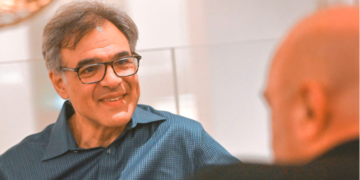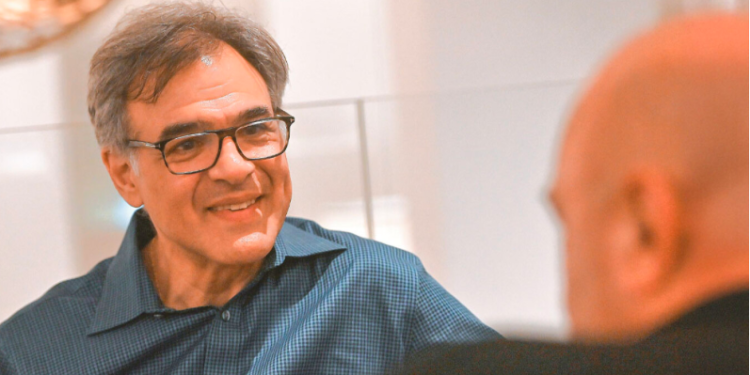John Kyriakou vividly remembers the day his successor in Athens inquired if he ever felt watched. He mentioned a red Toyota that seemed to be parked near his residence at all times. That prompted Kyriakou to recall a family photo taken outside his Athens home, which featured a red Toyota with a man seated inside in the background.
“17N captured my image in front of my house,” Kyriakou shared during his keynote speech at the Intelligence & Security Forum, an experience that profoundly affected him.
In an interview with “Proto Thema,” he reflected on his time in Athens, the 17N terrorist group, the names that were known to Americans at the time, and how he became a target after British Brigadier Stephen Saunders was murdered.
He elaborated on group members who were never caught, incidents involving bombings in Ambelokipi and Thessaloniki, and previously undisclosed details regarding his cooperation with William Basil, the architect behind a major phone-tapping scandal.
Kyriakou also addressed former CIA Director George Tenet’s blunders, the “Greek Mafia” at Langley, Virginia, and the dramatic capture of Zubaydah in Faisalabad during joint raids on 13 locations.
The Hunt for 17N
Prior to that operation, Kyriakou felt publicly targeted by the 17N group following their announcement after Saunders’s assassination. “I was very angry with myself because I had always prioritized security and believed I was in the clear,” he lamented.
When asked how 17N might have identified him, Kyriakou was straightforward: “I think it was an accident while they were searching for Saunders. Our homes were close, and they probably spotted the armored vehicle with diplomatic plates and thought, ‘This must be CIA.’ That’s likely when they took a picture of me outside my house.”
The Saunders Assassination
On June 8, 2000, two members of 17N on a motorcycle approached Saunders’s car on Kifisias Avenue and shot him four times. In his confession, Savvas Xiros admitted he was driving while Dimitris Koufontinas was the passenger.
When Kyriakou began working in Greece, he joined efforts to capture the group responsible for the assassination of CIA station chief Richard Welch in 1974. “We got close to 17N a couple of times, as we had names like Giotopoulos and ‘Sheriff,’ but my operations were limited to surveillance.”
During that period, the CIA’s Athens station reportedly employed various strategies to provoke the terrorist group into making mistakes that would result in arrests.
However, actions have consequences. On May 16, 1999, 17N launched a rocket attack at the German ambassador’s residence in Halandri.
The Woman of 17N
During this attack, Xiros sustained minor injuries, and his brother Christodoulos participated alongside Koufontinas. For the first time in 25 years, anti-terror police were able to recover DNA from a group member. “That attack disturbed us greatly, but we were even more shocked a few months later when they murdered Stephen Saunders. I remember a lengthy team meeting afterward. Following that, I saw a proclamation with my photo, and I had to leave Athens right away. Until that moment, I felt I was doing vital work and collaborating well with Greek security, but they killed Saunders simply because he was an easy target—and that frightened me.”
When asked if he thinks any 17N members are still at large, Kyriakou responds with a knowing smile: “During my time in Athens, the suspect list included over 1,200 names. That figure was inflated, as many were listed merely for being associated with far-left groups. I personally believe 4 or 5 members of 17N remain free—mostly men, along with at least one woman involved in Welch’s murder. If she’s still alive, she’d be around 75 now.”
Recent Bombings
He also addressed two recent incidents: an explosion that blew up an apartment in Ambelokipi and a bomb in Thessaloniki that killed a 38-year-old woman carrying it. “I think these are small cells lacking the experience of their predecessors—amateurs. However, if I were in the Greek police, I’d investigate groups opposing Israel and the Gaza conflict.”
Why the Americans Were Eavesdropping
Kyriakou departed Greece before the fall of 17N and the notorious phone-tapping scandal involving William Basil.
When asked how he would react if instructed to spy on Greek leaders, he said decisively: “I would refuse without hesitation. The CIA transformed my life in unexpected ways, but I would never engage in such operations—as I also refused to participate in torture. When asked, I said no.”
He clarified why the U.S. deployed illegal software to surveil Karamanlis, Voulgarakis, and others: “Wiretapping Greece’s political and military leadership follows the same rationale as eavesdropping on former German Chancellor Angela Merkel. You spy to gain insights into trade negotiations, defense budgets, Greece’s relationship with Turkey, and its ties with Russia. They could have simply asked, but instead, they opted for wiretaps, which backfired and strained relations.”
William Basil: “He Fooled Us All”
He speaks cautiously about William Basil, also known as “Bill from Karpathos.” “He was probably the kindest person I encountered at the CIA. I know that sounds odd, but that was Bill. He loved his job, family, and Greece. While stationed here, he was at his happiest. He often brought chocolates to the office that people would pitch in to grab, joking that he was the only ‘kiosk owner’ in Greece losing money!”
However, Basil’s official title was the Second Secretary for Regional Affairs at the U.S. Embassy in Athens.
A Sharpshooter
“I remember one day we visited a shooting range with anti-terror police. Bill was so accurate that he could have competed in the Olympics. A Greek competitor challenged him to shoot over his shoulder, without looking, at a piece of gum stuck to a wall. Bill accepted, fired blindly, and hit the gum.”
“There were about ten of us betting 1,000 drachmas he’d miss—but Bill proved us all wrong. I was stunned. The Greeks were yelling in disbelief. When I complimented him on his precision, he remarked he had loved shooting since childhood and practiced all his life.”
Ukraine and Syria
The conversation shifts to the war in Ukraine, and Kyriakou states firmly: “When this conflict concludes, Ukraine will lose Donetsk, Luhansk, and Crimea. It will never become a NATO member.”
What deeply concerns him, however, is the situation in Syria: “I’m very worried about the unfolding events in Syria, primarily because the U.S. allied with Al-Qaeda. With Al-Qaeda! The same group responsible for killing 3,000 Americans in one day. And we made its leader the president of Syria. You may have issues with Bashar al-Assad’s policies, but he was the only one standing between Christians and annihilation. We removed him with assistance from Turks and Israelis and installed the Al-Qaeda leader and ISIS deputy to govern Syria. Instead of eliminating him, we made him president!”
The Operation in Pakistan
Kyriakou has much to say about Al-Qaeda, having captured Abu Zubaydah—No. 3 in the organization—amid a mission involving 13 simultaneous raids: “It was March 28, 2002, when Zubaydah was captured in a Faisalabad house. He was so injured that I couldn’t perform a retinal scan, so they requested I send a photo of his ear. I did, and within minutes, they confirmed his identity.”
This capture marked the peak of his career but also led to his punishment from the U.S. after he resigned and disclosed the CIA’s use of waterboarding on the terrorist.
“I want to emphasize that I’m the only former CIA officer advocating for Zubaydah’s release—and I continue to do so.”

















